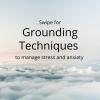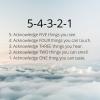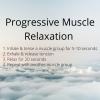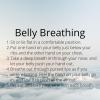Main Content
As COVID-19 case rates are declining locally and nationally, the safety measures – masks, physically distancing, and hand washing – that we heavily relied on to prevent the spread of COVID-19 are becoming less essential. Thanks to continued practice of safety measures and effective COVID-19 vaccines, students are now able to return to in-person classes and wearing masks on campus is no longer mandated after March 28, 2022. Now that the pandemic is trending to be less prevalent, Washington State and Pierce County are removing the COVID-19 mask mandates and more people are engaging in activities without physical distancing, which may contribute to feelings of anxiety and uncertainty as we explore what post-pandemic life – this new normal – will look like.
Just like it took time to adapt to incorporating these safety measures into our daily routines, it will take time to adapt to their gradual removal from our lives, at a pace which is safe for each individual. It is still important to make informed choices about safety measures such as mask wearing, physical distancing, and hand washing in many circumstances from reputable sources such as the CDC and local health departments.
It’s normal to feel anxiety and/or stress during times of change, especially when that change is related to the COVID-19 pandemic. In times of anxiety or stress, remember to focus on what you can control, such as your thoughts and actions, and consider these tips below to help you navigate this change.
Quick Links
Check out these quick links to helpful information about coping in a post-pandemic life.
The mask mandate removal does not prevent you from continuing to engage in mask wearing or other safety measures like physical distancing, rapid testing, and hand washing. While you can’t control other people’s actions regarding safety measures, you can control yours. If not wearing a mask or not physical distancing gives you anxiety, you can continue to engage in those measures. Perhaps, at first, limit large gatherings or time spent in high-traffic areas such as the gym and slowly work your way into the activities that seem overwhelming. But also, avoid engaging in complete physical and/or social isolation as that may contribute to further anxiety and may make reintegration more challenging in the future.
Although many are likely experiencing similar levels of anxiety about the mask mandate removal, acknowledge that some others may be experiencing more anxiety than you while others may be experiencing less. Our values, experiences, personal circumstances, and coping strategies shape our comfort level with the mandate removal and the respective anxiety we may feel about it. It’s important to mutually respect others positions and avoid comparing your response to others. Consider setting boundaries around people who may cause you distress if you dis/continue to wear a mask or engage in physical distancing
Schedule in time in your day-to-day life for self-care activities. These will look a little bit different for everyone, so consider what works for you. Activities that reduce your stress, help ground you in the present moment and identify feelings and emotions are great self-care strategies. Consider incorporating practices like deep breathing, mindfulness, and meditation to help you focus on the present and move your thoughts away from the anxiety-inducing concerns. Maintain a routine that works for you:
- Get at least 7-9 hours of sleep each night and get up at the same time each day
- Enjoy satisfying and filling meals and snacks
- Stay hydrated
- Exercise in ways that are meaningful to you
- Set at least one accomplishable daily goal
- Be mindful of moderation and practice harm reduction strategies if you choose to use drugs and alcohol
Focus on the facts and trust the experts. Consider the current case rate in your area and your level of protection. COVID-19 vaccines are effective at preventing adults and children ages 5 years and older from getting sick or severely ill. Find case rate data specific to your area of Pierce County here or use the CDC COVID-19 county tracker.




Making Intentional Decisions
The University of Washington continues to prioritize the health and well-being of the tri-campus UW community as we navigate this new normal. The UW was one of the first institutions in the country to offer remote course delivery and operations and one of the last to return to in-person. UW Tacoma is mindful of the Pierce County COVID-19 landscape as well as the unique factors that our UW Tacoma students, faculty, and staff navigate when considering COVID-19 precautions.
UW Tacoma will continue to coordinate with the Tacoma-Pierce County Health Department (TPCHD) to measure risk to our campus community. As of March 8, 2022, Pierce County measures a medium risk level with a 7-day case rate of 98.3 per 100,000. The UW Tacoma case dashboard displays one positive case in the last 10 days. The state and local mask mandates will end on March 12 as case rates, hospitalizations, and outbreaks are declining. We have much to celebrate and look forward to, but the TPCHD recommends continuing to engage in safety measures if you choose to and if you are immunocompromised.
The UW and the UW Tacoma will continue to implement precautionary measures as needed and where appropriate. The American College Health Association’s Updated Guidance on COVID-19 Management on Campus serves as a guide to all institutions to prioritize the safety of our community. Most of these measures are in place at UW Tacoma and while some measures may be more visible than others, all have contributed and/or continue to prevent and/or address the spread of COVID-19 in our community:
- Remote instruction
- Requiring face coverings and the COVID-19 vaccine
- Providing PPE
- Offering and promoting tele-health therapy services at Psychological and Wellness Services
- Health promotion efforts highlighting prevention measures and promoting vaccine uptake, health education, and student involvement
- Free COVID-19 rapid self-testing kits and surveillance testing
- Contact tracing
- Coordination with local Public Health departments
- Altering on-campus housing
- Limiting social gatherings and events
- Enhancing cleanliness and filtration of campus spaces and facilities
- Case metrics dashboard
- Maintaining opportunities for social connection with physical distancing and/or remote
Accessing Campus Resources
You don’t have to navigate anxiety, stress, or other mental health concerns alone. Consider accessing resources like Psychological and Wellness Services and/or MySSP for free, confidential, and professional mental health support. Reach out to friends, family members, religious and spiritual persons and other networks for support too – connecting in ways that are important to you and with the people in your life that contribute to your happiness is good for your well-being.
Psychological & Wellness Services (PAWS) provides free, confidential, problem-focused mental health counseling aimed at building better skills and exploring alternative ways of coping for currently enrolled UW Tacoma students. Services include individual, group, and crisis counseling as well as outreach and consultations. To begin services, start with a same-day appointment Monday through Thursday by calling 253-692-4522 or emailing uwtpaws@uw.edu.
UW Tacoma partners with MySSP to give students access to real-time, confidential mental health support, 24/7. MySSP counselors are licensed mental health therapists who are familiar with UWT resources and can provide support in multiple languages: Simplified Chinese, Korean, Arabic, Spanish & French.
Connect with MySSP in three ways:
-
Call 1.866.743.7732 (If calling from outside the U.S. or Canada, dial 001.416.380.6578).
-
Chat online with a MySSP counselor at myssp.app/ca/home. To get started, click Student Login at the top right, and select University of Washington Tacoma In State or Out of State Student.
-
Download the MySSP app (Apple App Store | Google Play) to have the full range of services at your fingertips any time.
Husky Coronavirus Testing is a voluntary research study that tracks community spread of COVID-19 by providing UW community members access to free rapid self-testing kits. Self-test kits available for pick up on the Ground floor of the Tacoma Paper & Stationery Building (TPS). Finished tests can be placed in the dropbox there as well. If you are not already enrolled in the testing program, you can enroll online.
The testing desk is open:
M: 9:00am - 4:30pm
T: 1:00pm - 5:00pm
W: 9:00am - 5:00pm
Th: 1:00pm - 4:30pm
F: 9:00am - 5:00pm
Student Health is a one-stop-shop that provides information about the services and resources available to students at no cost, such as Student Health Services, Psychological and Wellness Services, confidential advocacy, health education, and information about required immunizations, and more. Visit Student Health at www.tacoma.uw.edu/sh.
Further Reading
Check out these additional readings.
- Coping with Anxiety as Mask Mandates Lift, Michigan Medicine
- Post-Pandemic Anxiety: Life is Returning to Normal, So Why Do You Feel Anxious? Weill Cornell Medicine
- COVID Depression and Anxiety, Johns Hopkins Medicine
- How To Deal With Unexpected Anxiety About Life Post-Pandemic, Well+Good
Resources for Student Parents
- Return to School Roadmap: A Resource For Parents on Returning to In-Person Learning, US Department of Education
- FAQs for Parents and Caregivers about COVID-19 Precautions in Schools, Centers for Disease Control and Prevention
- COVID-19 pandemic: Helping young children and parents transition back to school, Centers for Disease Control and Prevention
